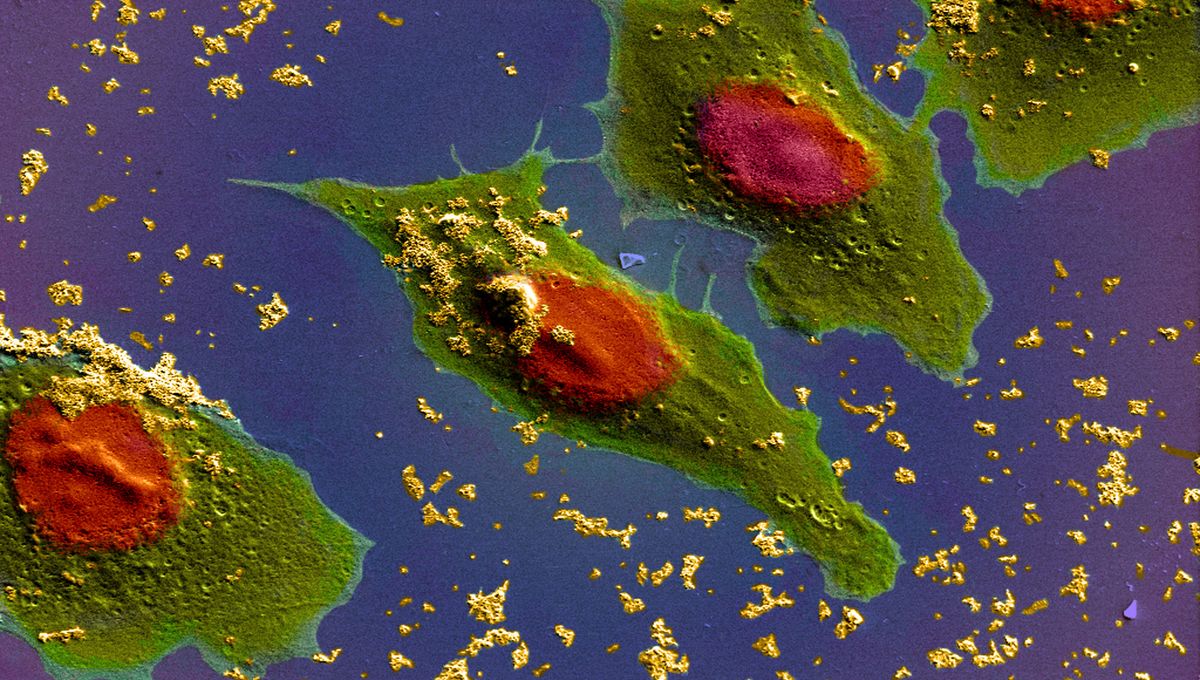
Dormant cancer cells in the lung could be reactivated after a bout of COVID-19 or flu, according to new research. The findings suggest that a respiratory infection could spark a chain of events leading to a new metastatic tumor in patients who have previously survived a cancer diagnosis.
Even after treatment and with a cancer being declared “in remission”, it’s still possible to find a handful of dormant cells left behind in different organs in the body. This study focused on metastatic breast cancer, which in humans often leaves behind traces in the lungs.
In some cases, these dormant cells can reawaken and lead to a recurrence of the cancer. Understanding why this happens is key to finding new ways to prevent it, and this study suggests that viral infections may be one potential culprit.
“Dormant cancer cells are like the embers left in an abandoned campfire, and respiratory viruses are like a strong wind that reignites the flames,” said senior author Dr James DeGregori in a statement.
“During the COVID-19 pandemic, anecdotal reports suggested a possible increase in cancer death rates, bolstering the idea that severe inflammation might contribute to arousing dormant [disseminated cancer cells],” added study co-lead Dr Julio Aguirre-Ghiso.
To test this, the team used a mouse model of metastatic breast cancer with dormant cells in the lungs. The mice were exposed to an influenza A virus and SARS-CoV-2. In both cases, though the mice recovered from the infections, the cells in their lungs began to proliferate, leading to cancerous lesions in the lungs within two weeks.
The team also checked their theory against two large population studies in humans.
The first of these, using UK Biobank data, found that COVID-19 almost doubled the risk of dying from cancer in patients who had had their initial cancer diagnosis at least five years prior, and who were therefore likely to be in remission at the time that COVID hit. This was after they corrected for deaths directly resulting from COVID.
“The effect was most pronounced in the first year after infection,” said researcher Dr Roel Vermeulen, echoing the rapid progression that was observed in the mouse models.
While the UK Biobank data covered all cancer types, the second study from the US Flatiron Health Database only included breast cancer survivors. Those who caught COVID-19 during the 52-month follow-up period were almost 50 percent more likely to develop lung metastases.
“Potentially of great clinical relevance”
Commenting on the study for the Science Media Centre, Professor Andreas Berthaler of the University of Vienna, who was not directly involved in the work, said, “The findings presented are innovative and potentially of great clinical relevance. The study provides mechanistic evidence for how respiratory viral infections reactivate dormant disseminated cancer cells and promote metastasis.”
This mechanism that the authors discovered involves an immune protein called interleukin-6 (IL-6). “It has a role in host defence against infection, but it can also trigger cancer-cell proliferation and promote tumour growth,” explain Brooke P. Dresden and John F. Alcorn in a News and Views piece published alongside the study.
Based on their findings, the team believes it’s possible that drugs targeting IL-6 could help combat the risk of recurrence in cancer survivors who catch a respiratory infection.
And there’s another unanswered question: what role could vaccines play? The COVID-19 human data was collected before vaccines were available, so it’s unclear whether getting a COVID shot could have prevented some of the cases of metastatic progression. However, Aguirre-Ghiso stressed that cancer survivors should certainly seriously consider precautions against respiratory infections, including COVID-19 and flu vaccines.
“Vaccination significantly reduces the risk of severe disease and thus of a severe inflammatory response after influenza or SARS-CoV-2 infection. It would therefore be expected that vaccination could also reduce the effect on metastasis formation,” added immunologist Professor Carsten Watzel to Science Media Centre.
While more research is needed to fully understand what’s happening mechanistically, and how far the findings in the mouse model can be applied to humans, the work could still impact clinical practice.
“The findings raise the question of whether there is a need to begin testing people in cancer remission during viral season to check whether any previously dormant [cancer cells] have begun to proliferate,” write Dresden and Alcorn.
The winter virus season is already in full swing in the Southern Hemisphere, and it won’t be too long before the north follows suit once more. “Respiratory viral infections are forever a part of our lives,” said DeGregori, “so we need to understand the longer-term consequences of these infections.”
The study is published in Nature.
Source Link: COVID-19 And Flu Could “Reignite” Dormant Cancer Cells And Bring On New Tumors